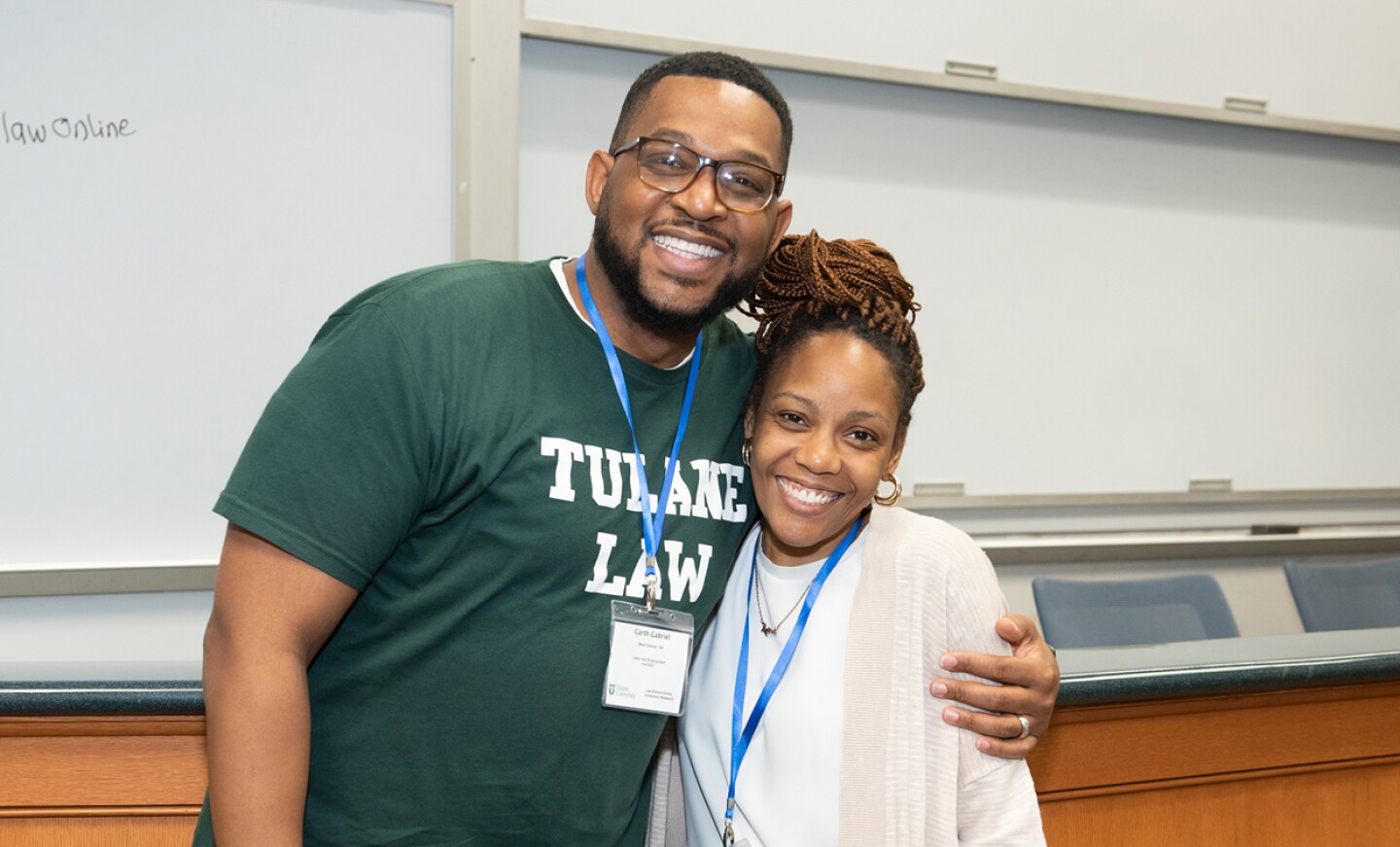Online MJ in Energy Law
Tulane University Law School is proud to offer an online Master of Jurisprudence in Energy Law to provide the tactical, practical legal training to support both regulators and regulated professionals in these complex fields, as well as members of advocacy groups and other organizations influencing public policy and its enforcement. After completing 30 credits of combined live and asynchronous instruction, you will build a new and vital skill set and knowledge base that will serve you whether you work in an energy-related industry or a regulatory agency.
Through in-depth coursework on the legal issues surrounding the development and regulation of fossil fuel, electricity, nuclear and renewable energy sources; climate change; and alternative dispute resolution mechanisms, you can build the expertise to adeptly navigate any regulatory challenge you might face in some of our planet’s most crucial evolving industries.
Program at a Glance
- 12 courses
- 30 credits
- Mix of required and elective courses
- Culminating capstone project course
- Mix of live classes and asynchronous coursework
- Complete in as few as two years
- Three opportunities to start per year
Supercharge Your Career
Are you ready to level up your career? Earn your master’s degree online with Tulane University. Our online Master of Jurisprudence programs give you the legal foundation to navigate today’s professional challenges.
Complete the form to get a program detail sheet for the online MJ program of your choosing. Get more details about your program, including information on Tulane Law School, the curriculum, application requirements and more.
This will only take a moment.
Study Law at the Leading-Edge of Energy Development
Tulane University is proud to offer the MJ in Energy Law. This program is an exciting opportunity for professionals working in the energy industry to grow their expertise around the laws and regulations impacting their daily work.
Is the MJ in Energy Law a good fit for you? Watch the video to hear from the faculty and staff members who have helped shape this degree program, along with the MJ in Environmental Law. Learn more about the online student experience, the scholars teaching the courses and why Tulane should be your top choice for furthering your education and advancing your career.
Video Transcript
The Master of Jurisprudence Program in Energy and Environmental Law—they are two separate degrees that offer non-lawyers who need to know about the complex regulatory interactions in the environmental context and the energy context.
Christopher Dalbom:
This degree gives them the ability to be really skilled and adept on the law side of things, as well as their professional background that they’re bringing to the degree.
The online Environmental and Energy Program is a program that’s intended for a wide variety of people who do some sort of job that interacts with the environment and with energy.
Saru Matambanadzo:
We not only have offline modules that you take on your own, lectures that you can download onto your phone but five live sessions a term where you get to interact with your classmates and you get to interact with your professors. So we have maximum engagement and also flexibility and we combine that in a really great way.
Jennifer Cooper:
And that's what we often hear from students—that they really feel that we have built a community for them. One of the things that makes our online program unique right and being able to kind of bring students together, even if they're not in the same residential space.
Christopher Dalbom:
The students learn from each other because the students are all coming from different places and different backgrounds and different experiences. They’re kind of coming together, of different disciplines and different experiences. I think this really benefits everybody in the program, students and faculty alike.
Sally Richardson:
Students should be applying to the Tulane Online Master of Jurisprudence program because of the unique opportunity Tulane can provide. We have scholars from the Law School who are teaching courses on clean water, on clean air, on all of the issues that really matter in the areas of labor and employment, energy law and environmental law.
Saru Matambanadzo:
The great thing about this degree—not only does Tulane have a long historical strength in the areas of energy and environmental law, we also are right on the front lines of things like climate change and energy development. And so you get a kind of perspective from our faculty and from your classmates that you wouldn't get anywhere else.
Only in New Orleans are you going to have this experience at the edge of energy development and climate change.
Engage With Experts Across the Field

In a field as dynamic and rapidly evolving as energy law, the best training often transcends the classroom.
As a leader at the forefront of this field, Tulane Law School operates the Center for Energy Law to promote crucial research, create dialogue across the field’s internal boundaries and support our students as they seek professional opportunities and work to deepen their knowledge.
The Center for Energy Law leads efforts to define the scope and purpose of “energy law” as an academic discipline and regulatory framework. It also holds an annual Energy Law Conference to bring together the top legal, academic and industry minds in energy law, and it offers unique career-building opportunities like company tours and field visits.
Supercharge Your Career Potential
Career opportunities abound in the energy industries, and a master’s in energy law can give you the expertise and confidence you need to seize one.
By receiving advanced training in the regulatory framework that governs energy industries in the U.S., you can guide energy corporations as they navigate existing complex regulations, help prepare industry veterans for the paradigm shift toward renewable energy and the legal framework that will structure that massive transition, help innovative startups develop the next wave of energy tech, and much more.
Earn your master’s in energy law from Tulane, and pursue roles in:
- Government agencies
- Think tanks and public policy groups
- Regulated energy agencies
- Renewable energy startups
- Investment firms
- Energy advocacy organizations

Online MJ in Energy Law Curriculum
The online MJ in Energy Law comprises 30 total credits, divided between 24 credits delivered over 9 core courses and an additional 6 credits of elective courses.
Core Courses
Environmental Law, Regulation and Policy Survey (3 credits)
Introduction to Legal Study, Research and Legal Writing I (2 credits)
Energy Law, Regulation and Policy Survey (3 credits)
Introduction to Legal Study, Research and Legal Writing II (2 credits)
Administrative Law (3 credits)
Dispute Resolution (2 credits)
Federal Regulation of Public Utilities (3 credits)
Environmental Justice & Public Trust (3 credits)
Capstone (3 credits)
Elective Courses
Natural Resources Law (2 credits)
Clean Air Law (2 credits)
Clean Water Law (2 credits)
Trees and Utilities: Law, Regulation, Policy and Practice (2 credits)
Electives in development:
- Alternative Energy Sources: Regulation and Development (2 credits)
- Pollution Control (2 credits)
- Hazardous Waste Law (2 credits)
- Law & Climate Change (2 credits)
- Fossil Fuel Regulation and Development (2 credits)
Elective courses offered in each term are subject to availability.

Study With Industry Leaders
Faculty who teach in the online MJ in Energy Law program are established legal and regulatory professionals with deep experience in every facet of their industry. Learn from the experts who have built standout careers on their thorough knowledge of complex bodies of law and their ability to adapt in an environment where change is constant, and hone your professional skill set under their unparalleled guidance.
Learn From a Leader in Online Education
Our online MJ in Energy Law program has been designed specifically for seamless delivery and engagement in an online format. Recorded lectures and course materials available 24/7 ensure you are able to complete the bulk of your assignments on your own schedule without sacrificing any of your existing personal or professional responsibilities. And weekly live courses help you strengthen the connections you’ll make with your classmates and engage more deeply with your professors’ deep subject-matter knowledge.


An Immersive Experience at Tulane
All students in the online MJ in Energy Law program take part in a dynamic Education Immersion Weekend. This two-day experience is your opportunity to visit our beautiful campus in the vibrant city of New Orleans, meet your faculty and classmates face to face, build your professional network, and engage in meaningful conversations and attend lectures on the issues impacting energy industries today.
Immersion Weekends are held each summer and all students are required to attend at least one during their time in the online MJ in Energy Law program.
Two Immersion Weekends will be held with dates in January and July.


